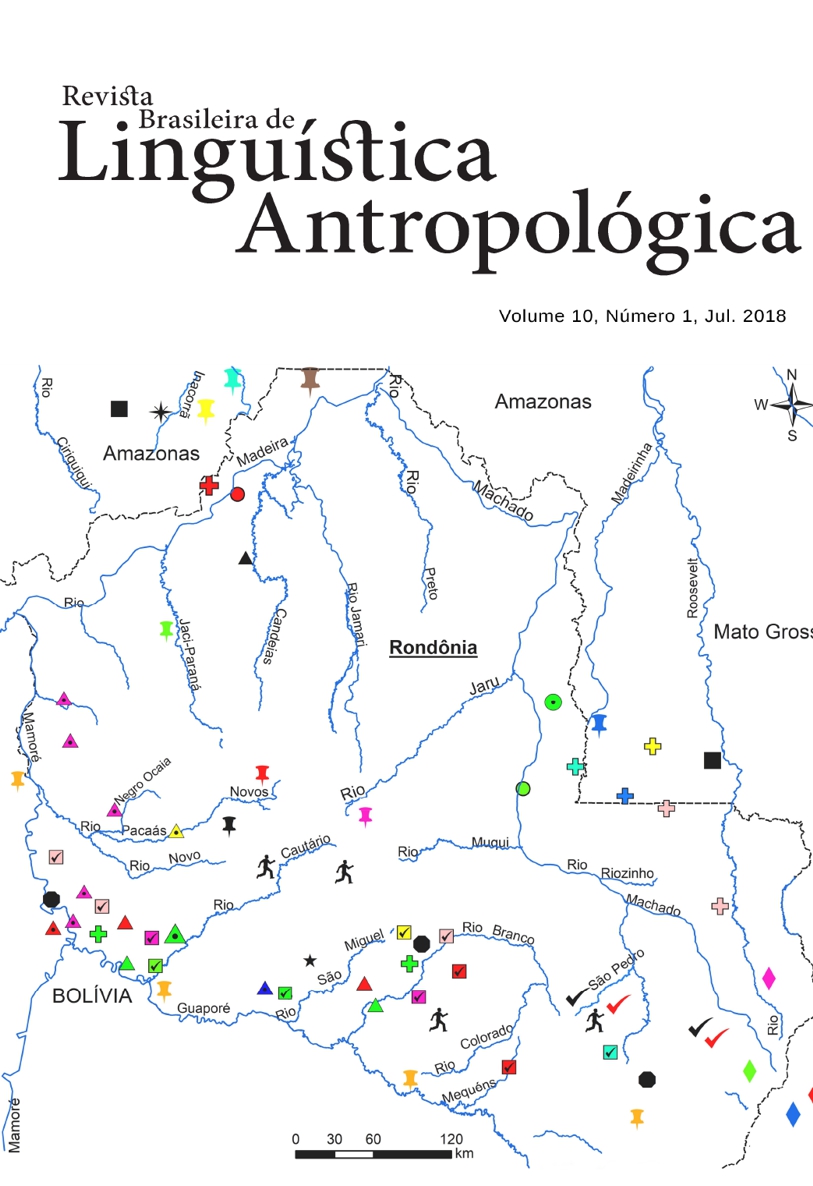Numerical Terms and Geometric Qualifiers in the Pangyjej Language of the Zoro Indigenous People
DOI:
https://doi.org/10.26512/rbla.v10i1.19055Keywords:
Numeric terms. Geometric qualifiers. Language Pangyjej. Zoró.Abstract
This article presents results of a research on numerical terms and geometric qualifiers in the Pangyjej language of the Zoró indigenous people. The research was carried out as a conclusion course in the Undergraduate Degree in Basic Intercultural Education offered by the Intercultural Education Department of the Federal University of Rondônia. One motivation for conducting the research was the absence of specific didactic material on traditional mathematical knowledge in the schools of the Zoró Indigenous Land. The methodological path involved photographic records, interviews with teachers and elders in Anguj Tapua and Zawa Karej Pangyjej villages, observations of daily activities of hunting, hunting and fishing, as well as informal dialogues with students from Zawa Karej Pangyjej school. As results, it was possible to register some numerical terms and geometric qualifiers referring to mathematical knowledge in the Pangyjej language. These results may support the production of specific didactic materials for the teaching of mathematics in Zoró schools.
References
Brandão, C. R. O que é educação. São Paulo: Brasiliense, 2007.
Brasil. Ministério da Educação. Referencial curricular nacional para as escolas indígenas. Brasília. 1998.
Costa, L. F. M.; Ghedin, E.; Souza Filho, E. A confecção de cestos e suas possibilidades pedagógicas para o ensino de matemática na escola indígena Ticuna. Educação Matemática Pesquisa, São Paulo, SP, v. 14, n. 1, p.105-125, 2012.
D’Ambrosio, U. Etnomatemática: elo entre as tradições e a modernidade. Belo Horizonte: Autêntica, 2011.
Fantinato, M. C. C. B. (Org.). Etnomatemática: novos desafios teóricos e pedagógicos. Niterói-RJ: Editora da UFF, 2009.
Ferreira, L. L.; Silva, A. A. A busca da autonomia no processo da educação escolar indígena. Cadernos de Educação Escolar Indígena, Barra do Bugres, MT, v. 5, n. 1, p. 57-63, 2007.
Ferreira, M. K. L. Madikauku: os dez dedos das mãos: Matemática e povos indígenas no Brasil. Brasília: MEC, 1998.
Freire, J. R. B. Trajetória de muitas perdas e poucos ganhos. In: Educação escolar
indígena em Terra Brasilis: Tempo de novo descobrimento. Rio de Janeiro: IBASE.
Freitas, R. M. C.; Ruiz, M. A. S. 2011. Etnomatemática: Sistema de Numeração
dos povos Indígenas do Alto Rio Negro no Estado do Amazonas. Anais do XV
EBRAPEM, Campina Grande, 2004.
Green, D. Os diferentes termos numéricos das línguas indígenas do Brasil. In: Ferreira,
M. K. L. (org.). 2002. Ideias matemáticas de povos culturalmente distintos. São
Paulo: Global, 2002.
Medeiros, N. M. J.; Miranda, M. G. Análise preliminar dos quantificadores numéricos e
não numéricos em Krenak (família Botocudo). Anais do VI Congresso Internacional
da ABRALIN. p. 2669-2672. João Pessoa: Editora Ideia, 2009.
Ribeiro, T. M. (Org.). Terra Indígena Zoró. Porto Velho: Kanindé, 2015.
Suruí, A. P.; Leite, K. G. Etnomatemática e Educação Escolar Indígena no contexto do
povo Paiter. Zetetiké, Campinas, SP, v. 26, n. 1, p. 94-112, 2018.
Downloads
Published
Issue
Section
License
Copyright (c) 2018 Revista Brasileira de Linguística Antropológica

This work is licensed under a Creative Commons Attribution 4.0 International License.
Authors who publish in RBLA agree to the following terms:
a) Authors maintain the copyright and grant the journal the right of first publication, and the work is simultaneously licensed under the Creative Commons Attribution License, which allows the sharing of the work with recognition of the authorship of the work and initial publication in this journal.
b) Authors are authorized to assume additional contracts separately, for non-exclusive distribution of the version of the work published in this journal (eg, publish in an institutional repository or as a book chapter), with recognition of authorship and initial publication in this journal.
c) Authors are allowed and encouraged to publish their work online (eg, in institutional repositories or on their personal page) at any point before or during the editorial process, as this can generate productive changes, as well as increase impact and citation of the published work.










